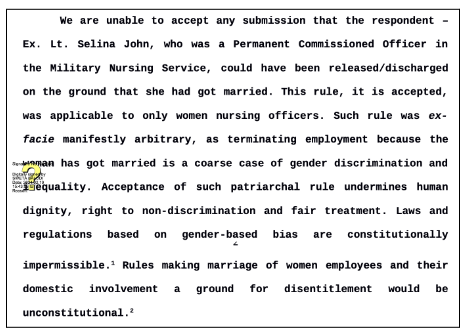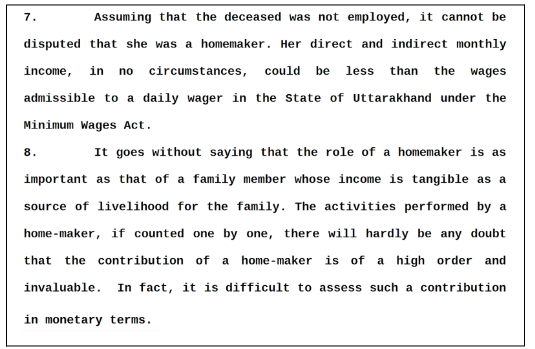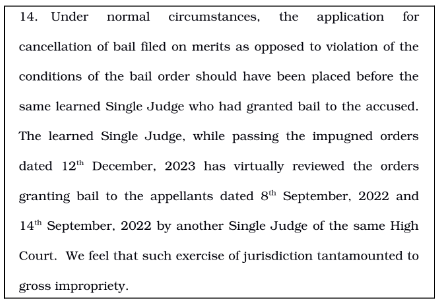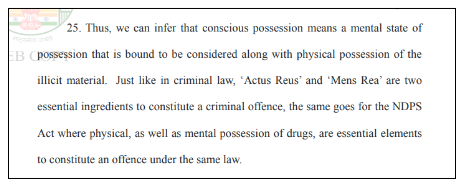In this edition of the Court judgements review, we look at SC’s order that terminating Women Officer on the grounds of marriage is illegal and an act of gender-bias, that homemaker’s deemed income cannot be less than the minimum wage, SC’s order that bail granted by one bench of High Court cannot be cancelled by another bench among others.
SC: Terminating Women Officer on the Grounds of Marriage is Illegal and an Act of Gender-Bias
In the case of Union of India vs. Ex. Lieutenant Selina John, the grounds of marriage and gender bias showed in terminating the services of women army officer Selina John, who held the position of Lieutenant (Lt.), were held as illegal by the Supreme Court (SC). The facts of the case were that Respondent (Lt. Selina John) was serving in the Military Nursing Service (MNS). She was terminated from these services by citing her marriage as the reason for termination. As per Army Instruction No. 61 of 1977 titled “Terms and conditions of service for the grant of permanent commissions in the Military Nursing Service”, the women nursing officers serving in the Army shall be terminated from their services if they get married. This was appealed in the Armed Force Tribunal by Lt. Selina John. The Tribunal held her termination as illegal and ordered compensation of Rs. 60,00,000 to be paid and also ordered reinstatement of her position in the army.
The Union of India appealed against this order in SC. The SC held that the rules which cited marriage and gender as the reasons for termination are ex facie manifestly arbitrary, wrong, and illegal and termed them as “coarse cases of gender discrimination and inequality.” It further held that such a rule is constitutionally impermissible, as it would undermine human dignity, the right to non-discrimination and fair treatment. Accordingly, the SC upheld the order of the Tribunal in terms of the compensation to be paid to Lt. Selina John. However, the SC modified the order of the Tribunal on the reinstatement of Lt. Selina John citing that she worked as a nurse for a short time in a private organization.

SC: Homemaker’s Deemed Income cannot be less than the Minimum Wage
In Arvind Kumar Pandey & Ors vs. Girish Pandey & Ors, the SC held that the deemed income of the homemaker cannot be less than the income of a daily wager under the Minimum Wages Act (MWA). The facts of the case were that Smt. Sushma Pandey (Deceased) died in a car accident in the year 2006 when she was travelling with the respondents in the case, who are her close relatives. Subsequently, an Appeal was filed before the Motor Accident Claims Tribunal by the Husband and Children (Appellants) of the Deceased. The Tribunal had dismissed the Appeal citing the vehicle which met with the accident was not insured. This order was appealed by Appellants in the High Court (HC), which remanded the matter back to the Tribunal. The Tribunal awarded a sum of Rs. 2,50,000. Claiming that the compensation awarded was too little, the Appellants went in Appeal to the High Court (HC), which dismissed it. Therefore, the Appellants have approached SC.
The SC held that even assuming that the deceased was unemployed, her direct and indirect income cannot be less than the wages of daily wager under the MWA. It also held that the income of homemakers is tangible as the source of livelihood and that the services rendered by homemakers are of high order and invaluable in monetary terms. Accordingly, the SC awarded the compensation of Rs. 6,00,000 to be paid to the Appellants.

SC: Bail granted by one bench of High Court cannot be cancelled by another bench
In Himanshu Sharma & Ors vs. State of Madhya Pradesh, the SC held that the cancellation of bail granted by one bench of HC cannot be cancelled by another bench, as such an exercise is tantamount to judicial impropriety/indiscipline. The facts of the case were that the Appellants were arrested by Madhya Pradesh (MP) police in cases related to cheating and forgery under sections 419, 420, 467, 468, 470 and 471 of the Indian Penal Code (IPC) and Sections 25 and 27 of Arms Act. The Chargesheet was filed by which time the appellants were already granted by the single bench of HC on 8 September 2022 and 14 November 2022. Subsequently, the State of MP moved an application under section 439 (2) of the Criminal Procedure Code (CrPC) seeking the cancellation of bail to the Appellants. The matter was considered by another single bench of HC, and vide orders dated 12 December 2023, it had ruled for cancellation of bail to the accused, and they were asked to surrender within 15 days.
The accused appealed the order of 12 December 2023 in SC. On 20 February 2024, the SC held that under normal circumstances, the matters of bail cancellations are placed before the same single bench which had granted bail earlier. But, in this case, the contrary exercise was followed, which is tantamount to gross impropriety. Accordingly, the SC had set aside the bail cancellation orders passed by a single bench of HC on 12 December 2023 by holding that they are grossly illegal.

Madras HC: Mental State of Possession along with Physical Possession of prohibited substances is the necessary element to constitute Crime under NDPS Act
In the case of X vs. Y, the Madras HC was dealing with criminal cases filed against two of the accused. Both were found carrying 23 kilograms (kgs) of Ganja, the banned substance under the Narcotic Drugs and Psychotropic Substances Act (NDPS), on a two-wheeler. While Accused 1 (A1) was found in physical possession of the bag containing Ganja, Accused 2 (A2) was riding the bike on which both A1 and A2 were travelling with Ganja. Upon receipt of secret information, the Police went on a raid. Seeing the police, the A2 had run away, while A1 was nabbed and arrested. Later, both were produced before the lower court, which found them guilty of the offence and sentenced to 10 years of rigorous imprisonment. This was appealed against by the accused in the Madras HC and pleaded for suspension of sentence against them.
The Court found that A1 has a history of similar types of offences against him. Therefore, it did not interfere with the sentence proclaimed against him. The argument raised by A2 was that he was only riding the bike and was not aware of the possession and carrying of Ganja by A1. It was also argued that he was a student and out of normal fear, he had run away after seeing the police, when they had for raid. The Court held that similar to criminal law, the physical possession and mental state of possession are the elements that constitute the commission of an offence under the NDPS Act also.

In this case, the court held that the reasons given by A2 did not satisfy the facts of the case to suspend the sentence given against him. Accordingly, the HC upheld the order of 10 years imprisonment given against both A1 and A2.
Delhi HC: Publications on Public Life of Public Personalities cannot be stopped, unless they amount to harassment and invasion in private life
In the case of Mahua Moitra vs. Directorate of Enforcement and Ors, the Delhi HC held that the public life of public figures is subject to closer scrutiny and that the publications made about them by media, government, court and others cannot be stopped, unless they infringe the privacy or lead to harassment. The facts of the case were that the Petitioner is a former Member of Parliament (MP) and is undergoing investigation by the Enforcement Directorate (ED), the Respondent. According to the Petitioner, the proceedings of the investigations such as the issuance of sensitive information on summons issued to her, extension of time sought by her to attend the enquiry, and other things related to proceedings against her were being leaked by the Respondent even before she has been receiving the same information. Accordingly, the Petitioner had approached HC claiming that the Respondent violated her right to privacy and dignity and right of fair investigation.
The Court held that the public life of public personalities such as the Petitioner is subject to closer scrutiny since they represent the public. Article 19(1)(a) of the constitution of India includes freedom of the press and communication needs in a democratic society i.e., the right to be informed. Modern communication mediums advance the public interest by informing the public about events and developments that take place in the lives of the leaders who represent them.

Viewed from the same perspective, the court held none of the news reports that the petitioner had brought before the court related to invasion into her private life or cause harassment. Accordingly, the petition was dismissed.


